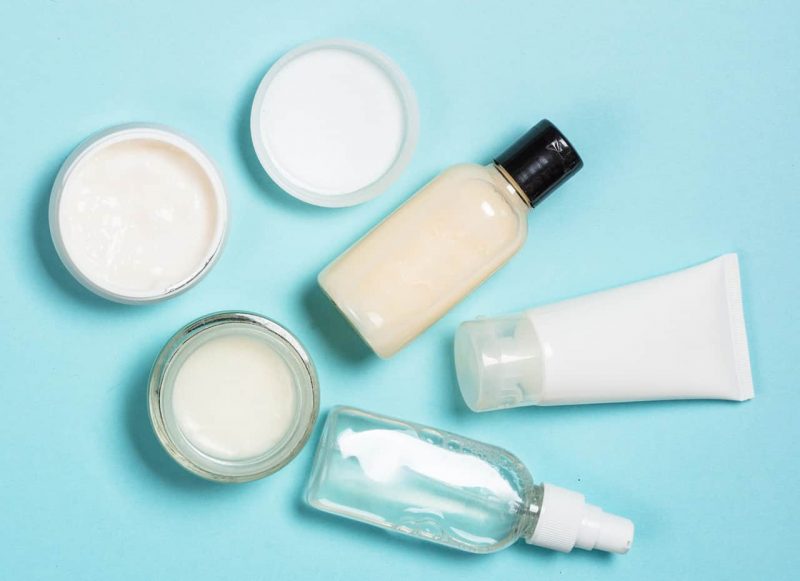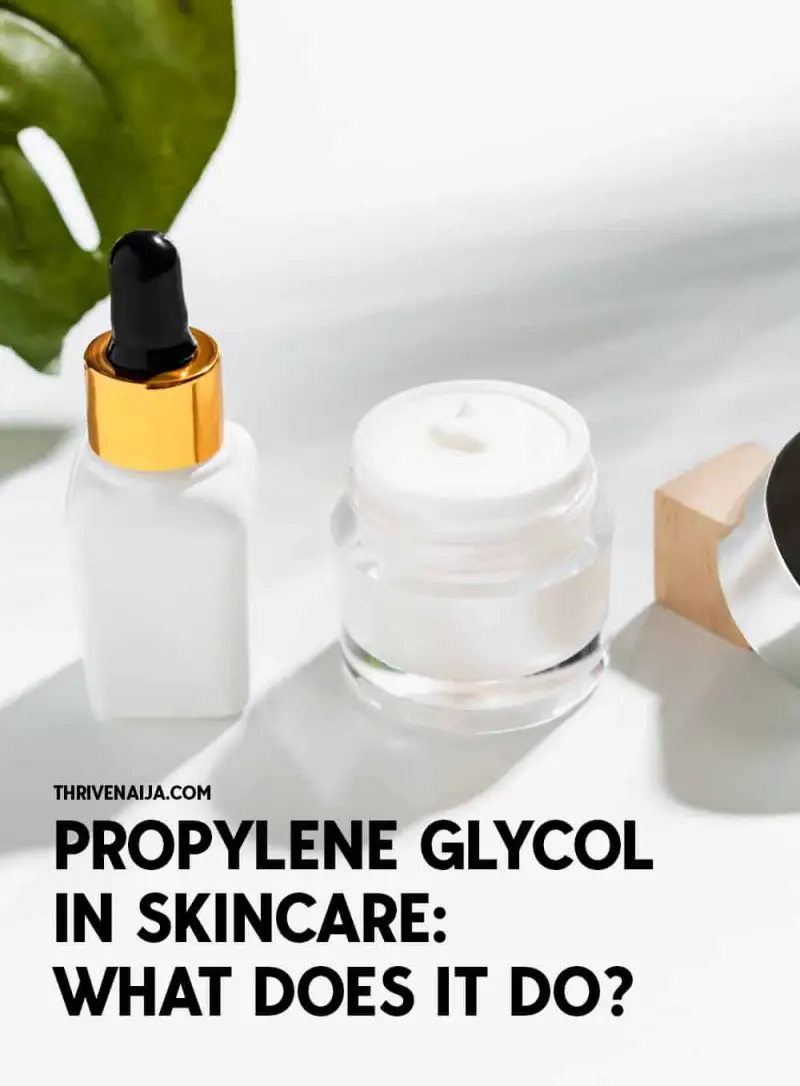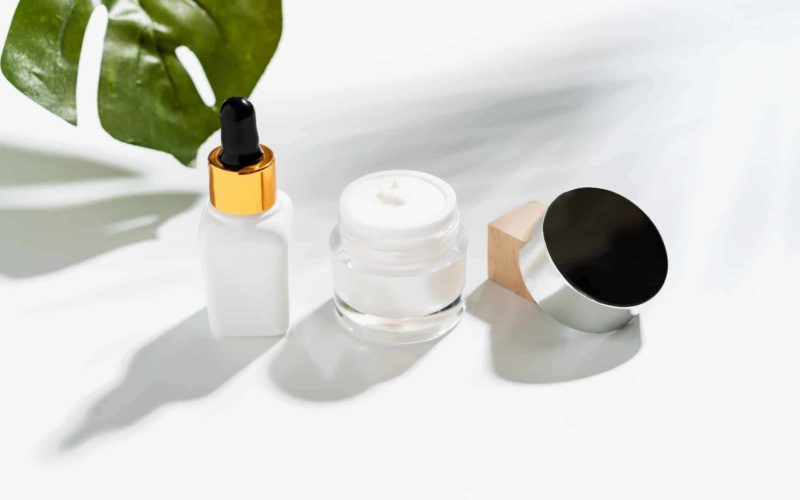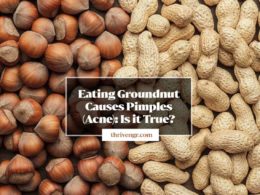Propylene glycol is a humectant (hydrating) and delivery ingredient used commonly in cosmetics along with other ingredients like glycerol and glycol, it’s important to be aware of chemical ingredients in your skincare products and furthermore…
Lots of people are not sure if propylene glycol being part of skincare ingredients is advisable.
Is propylene bad for your skin? What do you need to know about it? What does it do?
Here are questions every cosmetic user wants an answer to and this would be explored in this post.
What Is Propylene Glycol?
Propylene glycol is an organic, synthetic compound that absorbs water. It is used by the chemical, food and pharmaceutical industries in makeup, shampoos, cleansing creams, and other cosmetics (1). It’s a colorless liquid and often use in food preservation and in general glycols are non-irritating, have very low volatility and very low toxicity (2).
Propylene glycol is nearly odorless but possesses a faintly sweet taste however it has become controversial as it is been used as ingredients for antifreeze which brings about the concern of if it is safe for food and skin.
Propylene glycol is actually confused with ethylene glycol as both have been used as antifreeze due to their low melting points however these ingredients are not the same, ethylene glycol is a harmful substance and it’s not used in foods.
Where And How It Is Used?
Propylene glycol is present in half of all tropical products (3), it is commonly used in products to aid the processing, used as food preservative, mainly found in cosmetics and it’s extremely useful to beauty brands and pharmaceutical industries, propylene glycol acts in multiple functions and some of it includes absorption enhancer which allows both good and bad ingredients to be absorbed faster into deeper parts of the skin.
Why Is Propylene Glycol Used In Skin Care Products?
Propylene glycol is used as one of the ingredients in skincare products to enhance its functionality, to make it easier for other ingredients to break the skin barriers, it is also used to increase productivity and texture, relatively small amount is required.
Propylene is also a skincare ingredient that penetrates the skin but the absorption through the skin is minimal.
Propylene glycol can only cause skin irritation if you have sensitive skin or an allergic reaction to it, it is advisable to watch out for this product if you have an allergic reaction to skincare ingredients, your dermatologist can easily prescribe a substitute for you.
Is Propylene Glycol Dangerous In Cosmetics?

According to the US Food & Drug Administration, propylene glycol is can be said to be generally recognized as safe (GRAS) for direct addition to food. It’s also permitted to be used as a defoaming agent in indirect food additives (5).
Propylene glycol is pretty common in skin and hair products however as regards the negative comments, it’s not considered harmful to the skin but believed to cause irritation if you have sensitive skin.
While it’s not uncommon for a skincare ingredient to be misunderstood, propylene glycol is often a source of concern due to its usage in antifreeze and other industrial products (6).
Is Propylene Glycol Dangerous On Sensitive Skin
One typical condition associated with propylene glycol is mild skin irritation and it is further believed that the health issue associated with it is complicated, most skins are pretty sensitive hence the irritation however it’s still a legal ingredient in many foods including flavored coffee ice tea (7).
If you do have sensitive skin, ensure to talk to your dermatologist to prescribe a skincare product that has no propylene glycol.
The Dangers Of Propylene Glycol
Some websites state propylene glycol is safe while some deemed it unsafe however it is noted that the substance does have a limit and can be dangerous to some certain people.
1. Skin Irritation And Allergic Reaction
This has been stated earlier and it’s one of the most adverse demerits associated with propylene glycol, a certain redness of skin might start to show and happens in people who are allergic to the chemical and it tends to subside after a short period of time after the body has had time to break down the compound, you should seek your doctor if this symptom continues (8).
Mild irritation can also take place in the eyes and facial area if you have a pretty combination or sensitive skin, a rash may also develop if it comes in contact with a sensitive part of the skin. Most products you should watch out for include shampoos, facial cleanser, and medications (9).
2. Risk Of Heart Attack
It has been claimed to increase the risk of heart disease and heart attack (10) when it comes to skincare products, you are never too sure of what to expect especially if there is a viable chance of risking one’s health.
Animal studies show that very high doses of propylene glycol can rapidly decrease heart rate, cause low blood pressure and even cause the heart to stop hence the perfect solution is to ensure this was prescribed by the doctor (11), (12).
It is important you should note that research seems to record dangers only when used in a high dosage of medication and this occurs mostly in a vulnerable age group (13).
3. Not Safe For Infants And Pregnant Woman
Pregnant women, infants under four and children may be at risk of toxicity if they are exposed to a large amount of medication as they do have a lower level of an enzyme known as alcohol dehydrogenase, this can put them at a risk especially infants, hence this products should only be used on infants if prescribed and used in the right dosage (14).
Young children and infants would not be able to process propylene glycol as effectively as adults due to their high toxicity, therefore, they are a risk of developing symptoms as it tends to build up in their bodies when exposed to high doses (15).
4. Dangers For People With Kidney And Liver Disease

Propylene glycol can be easily broken down in adults with normal kidney and liver function but this might not be so in adults with kidney and liver disease (16).
A 2007 study from the University of Connecticut assessed the treatment of propylene glycol toxicity and also noted it can be dangerous for those with liver problems, this is viable if the high dosage is being taken and sine the body can’t break it down easily, it builds up and causes more damages (17).
How Can You Avoid It?
Propylene glycol might be deemed safe but if you do have an allergic reaction to it or a sensitive skin, you should always read the label on your skincare products to make sure it’s not included before using, it can also be found in common foods like drinks, marinades, cake mix, food coloring, frosting, popcorn fast foods, bread, and dairy products (18).
You should look out for its alternative names like:
- Propylene glycol
- Propylene glycol mono and diester
- E1520 or 1520
It is important to talk to your doctor or pharmacist in order to be aware of your allergic reaction and an alternative can be made available.
While they are cases of high toxicity in propylene glycol, it is not exactly a very dangerous medication of skincare ingredients and all you need is the right dosage, propylene glycol is actually very low toxicity substance and keeps in mind that a healthy product will not contain high toxicity of propylene glycol.
Read more on beauty and skincare from our archives:
- 9 Vitamin C Benefits for Skincare (Best Vitamin C Serum to Buy 2019)
- 7 Incredible Vitamin E Oil Benefits for Skin Care
- Should You Use Face Oils If You Have A Oily Skin?
- What Are The 5 Skin Types? A Guide to Knowing Your Skin
- 6 Facial Skincare Hacks We Bet You Haven’tTried
- Why Creating a Skincare routine is a Perfect Way to Save your Skin










